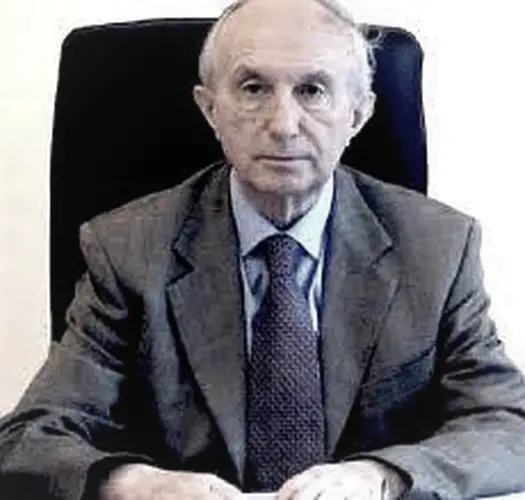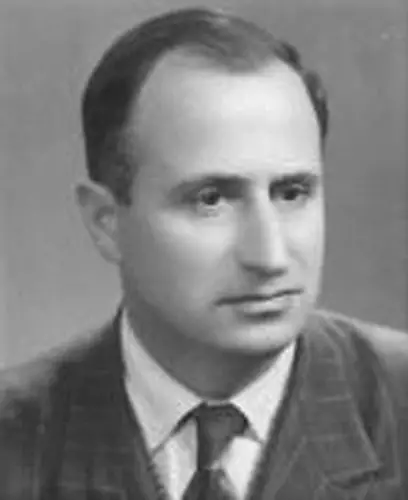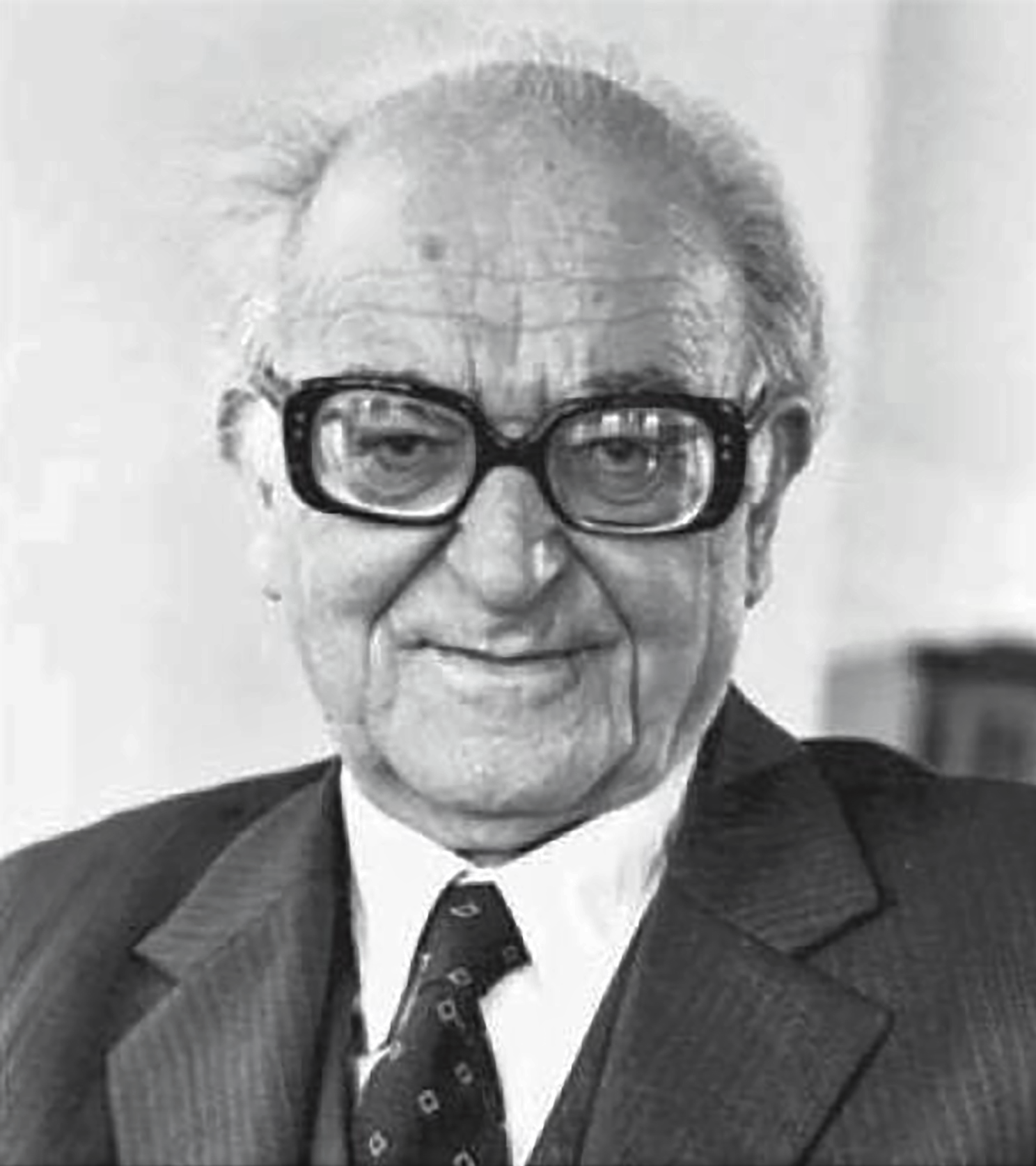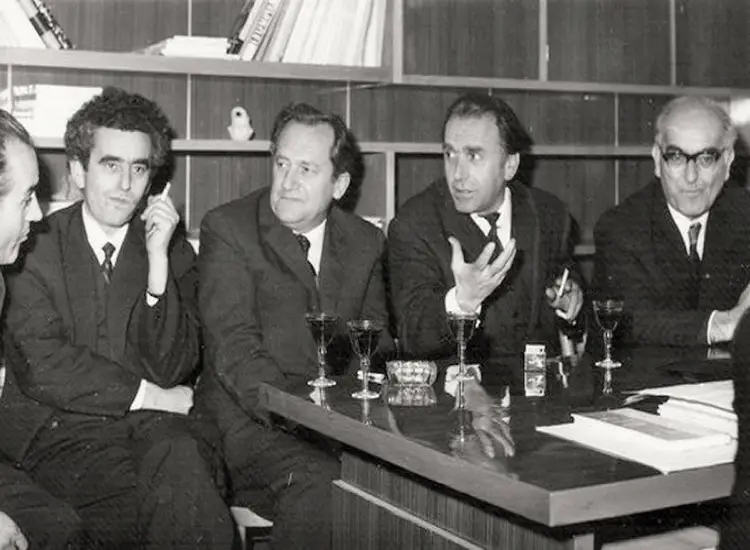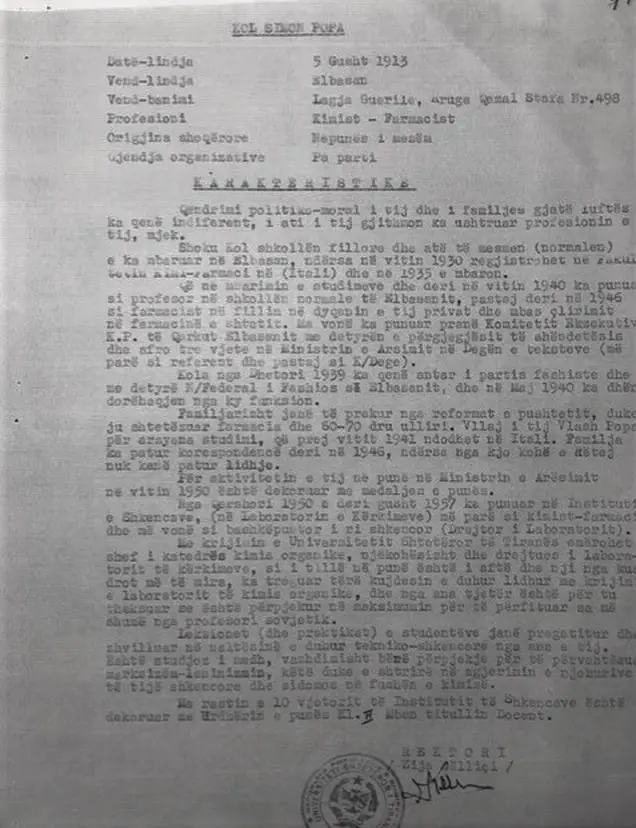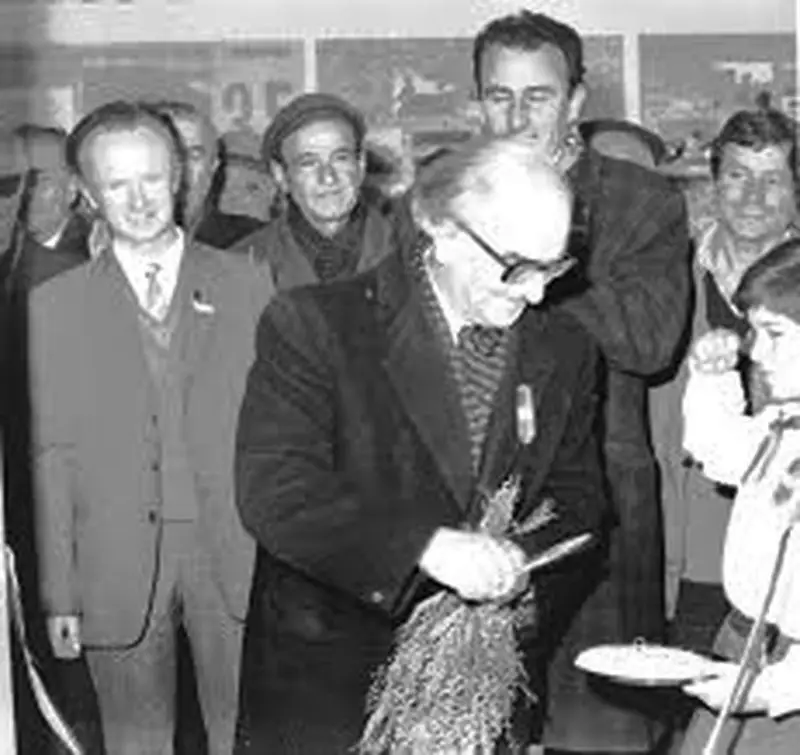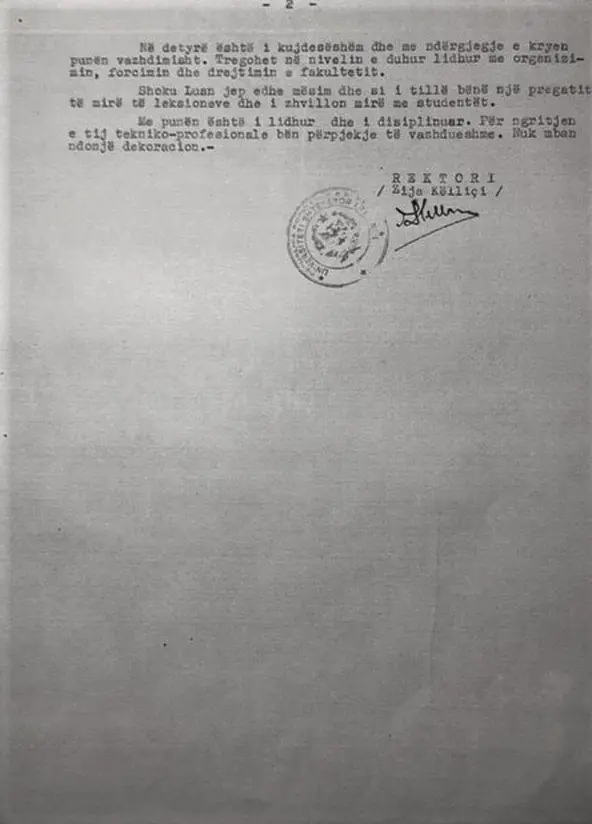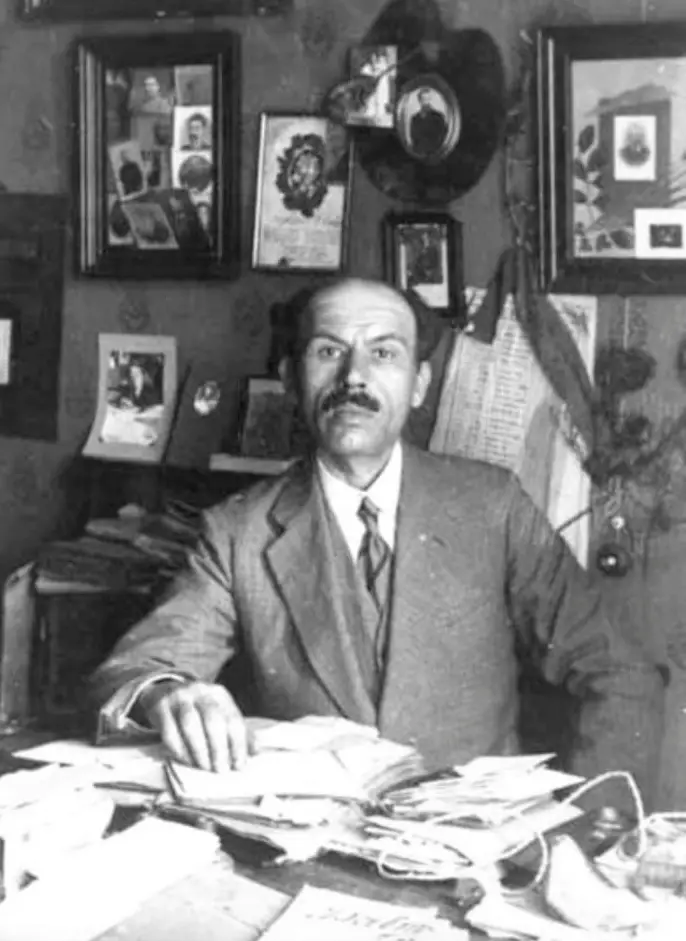Dashnor Kaloçi
Second part
Memorie.al publishes some archival documents extracted from the Central State Archive in Tirana (the fund of the former PPSh Central Committee) which belong to the year 1960 and are part of a voluminous file, where the characteristics of some of the intellectuals, the most famous professors and academics of Albania at that time, such as: Aleks Buda, Stefanaq Pollo. Col. Popa and Luan Omari, who years later were selected and led for years the Academy of Sciences of the People’s Republic of Albania, or other educational institutions. In the documents in question, which bear the signature of the Rector of the State University of Tirana, Zija Kelliçi and the secretary of the Party Committee of that university, Deko Rusi, for the four professors and well-known academics, in addition to the family biographical aspects, there are also many absurdities , such as for Prof. Aleks Budën, where it is said that: “he is lazy and does not sit down to write, because he is a bit lazy”, for Prof. For Prof. Luan Omarin: “when his father was shot, he was very demoralized, Luan was with ‘Balli’ and two of his aunt’s sons, Isa and Hivzi Kokalarin, were in prison”, for Prof. Col. Popa, “former member of the Fascist Party, but tries to introduce Marxism-Leninism into the subject of Chemistry”, etc.
Continues from last issue
50 years ago, on October 10, 1972, the Academy of Sciences of Albania was founded and Prof. Aleks Buda, while the vice president, Prof. Col. Popa and its general secretary, was appointed Prof. Omar plays. The three honored professors who had graduated from different universities outside Albania, at that time but also afterwards, were considered intellectual capacities and names from the most prominent in the respective fields, making great contributions, wherever they had served, based on the laws, opportunities and frameworks of that time.
Their appointment at the head of the Academy of Sciences of the People’s Republic of Albania, was the nomenclature of the Secretariat of the Central Committee of the ALP, or rather Enver Hoxha himself, and based on this fact; they would first pass through a “filter” of thin, “sifting” everything from their life. One of the main documents that was included in the “cadre file” and was taken as a basis for their career was the document with the personal characteristics, which was described briefly and in detail, both biographical and social aspects, behaviors at work, professional preparation, etc.
And based on this rule, the three highest leaders of the Academy of Sciences, the honorable professors: Aleks Buda, Col. Popa and Luan Omari, have been attached to the relevant staff files, their characteristics, which bear the signature of the rector of The State University of Tirana at that time, Zija Kelliçi, as well as the secretary of the University Party Committee, Deko Rusi. Their characteristics were compiled in 1960, when official Tirana had not yet broken official relations with the Soviet Union and, according to the rule, it (Characteristics) followed the relevant cadre in every new job or function where he was appointed.
In all three of these characteristics, where it is clearly seen that most of them, there are such absurdities, such as for prof. Luan Omarin, where it is said: “The shooting of the father, demoralized him…”, or about prof. Aleks Budën: “He is lazy, he doesn’t keep his promises and he doesn’t sit down to write…”, while for prof. Popën: “He tries to introduce Marxism-Leninism in the field of Chemistry”.
Aleks Buda, son of one of the most famous and aristocratic families of Elbasan, the son of a pharmacist (Taq Buda), who graduated from European schools in the early years of the last century and financier of the “Normal” School of Elbasan, thanks to a large fortune, which they also had, from 1920 to 1938, for 18 years in a row, he studied and graduated in the most popular colleges and universities in Austria, thus being among few of his compatriots, who had this opportunity of education.
Likewise, during the period of the occupation of the country, 1939-1944, openly “betraying” the social class to which he belonged, he first worked and fought as an illegal in Tirana and Elbasan, which led to his being elected to a high office, of the vice-president of the National-Liberation Council of Elbasan District and to the Provisional Government of Berat, headed by General-Colonel Enver Hoxha.
And after the end of the War, in the years that followed, Alex Buda exercised a series of duties; since head of section in the Ministry of Education, Director of the National Library in Tirana, Director of the Institute of Language and Literature, etc., to reach in 1972 the position of President of the Academy of Sciences of Albania.
But even though he had these achievements, for “party friends” and apparatchiks of various institutions, he was a man who “did not know how to organize, who promised a lot and did not keep his promises, and also a bit lazy”.
This is how the professor and academician Alex Buda was considered, one of those who had the fate of his life and career in his hands, but there was even worse. Because his two nephews, Niko and Pirro Dodbiba (former Minister of Agriculture in the 70s), experienced the cells, prisons and internment camps of Enver Hoxha’s communist regime.
The “same fate” as professor Buda was more or less shared by his colleague and close friend, the well-known professor Stefanaq Pollo, originally from a rich merchant family in Përmet, the son of an immigrant and patriotic activity of the society. Vatra” (Themistokli Pollo), who in 1920, responded to the call “Homeland in danger” given by the Government of Lushnja, to come to Albania and fight with weapons in hand against those who did not want the creation of the Albanian state .
Even Stefanaqi himself, after having studied at the French Lyceum of Korça, followed his father’s path, engaging from the beginning of the Anti-Fascist Movement, in the city that was otherwise known as “Little Paris”, to then go to the mountains, with a gun in hand, in the partisan formations, where he was charged with a series of tasks with the Anti-Fascist Youth and the Press and Propaganda.
Immediately after the end of the war, Stefanaqi was sent to study in Moscow and after graduating in 1950, he returned to Albania, to exercise a series of high tasks in the field of knowledge, such as: vice president of the Institute of Sciences and then Dean of the Faculty of History and Philology at the State University of Tirana.
But even with this past, again “party friends” were not satisfied with his work. And they dismissed him from office, as “he did not do the dean’s job willingly and happily, because he tended to personal interest”, without forgetting the main thing, that “he had also had a cousin sentenced to 20 years in prison, as an enemy of the people’s power” .
The archival document with the characteristics of the former general secretary of the Academy of Sciences of Albania, Dr. Prof. Omar plays
BAHRI OMARI PLAYS
Date of birth: June 16, 1925
Place of birth: Tirana
Place – residence: “Partizani” neighborhood, “Kongresi i Përmet” street, No. 63 Tirana
Social origin: Senior civil servant
Profession: Lawyer
Organizational status: A. P.
C H A R A C T E R I S T I K E
He comes from a bourgeois family. His father, Bahri Omari, was in Italy from 1925 to the summer of 1939 (installed in the city of Bari). In 1927, Luani and his mother went to Italy. During the occupation of Fascist Italy in Albania, Bahriu had important functions: with the creation of the “National Front”, he became its ardent exponent.
During the German occupation from February to May 1944, he was Minister of Foreign Affairs of the Quisling Government of Rexhep Mitrovica. For this fascist activity to the detriment of the Albanian people, Bahriu was arrested by our popular government and sentenced to death and executed as an enemy of the people. Luani had an affair with ‘Balli’ and two of her aunt’s sons, Isa and Hivzi Kokalari, were in prison.
Comrade Luan, as early as August 1942, has started working in favor of the Nac-Çl Movement. becoming active in a youth agitation group, which was formed at that time by comrade Nako Spiro, and at the beginning of 1943, entered the editorial office of “Kushtrimi i lirisa”.
In March 1944, he became a member of the Anti-Fascist Youth Committee of Tirana. When the 1st Congress of the Albanian Anti-Fascist Youth was to be held, a delegate of the youth of Tirana was appointed, but he did not go on the pretext of his mother’s illness. He later regretted it, considering it an unforgivable mistake.
The shooting of his father (April 1945), caused in Luani, a feeling of impression and demoralized him enough: he thought that his treatment would not be the same (it would not be looked at favorably), but in June of that year (1945), when he was assigned to work as a member of the collegium of the “Bashkimi” newspaper, he changed his mind and his morale began to rise, considering this a proof of the faith that the Party and Power have towards him.
Comrade Luan, for his good attitude, was sent by our Government to complete his higher studies from the end of January 1947 until July 1948, at the Institute of Law in Belgrade.
With the breakdown of relations with Yugoslavia, he was sent to Sofia (Bulgaria) to complete his studies, and in March 1951, he graduated as a lawyer. After he returned to Albania in April of that year, until August 1955, he worked in the Ministry of Justice with various responsibilities, as Head of Section and Head of Branch.
With the beginning of the academic year 1955-1956, he was appointed as Deputy. Director of the High Legal Institute and with the establishment of the University, he was appointed dean of the Faculty of Law.
He is careful in his duties and always performs his work conscientiously. It is shown at the appropriate level regarding the organization, strengthening and direction of the faculty.
Comrade Luan also teaches, and as such he prepared his lectures well and developed them well with the students.
He is tied to work and disciplined. For his technical and professional development, he makes continuous efforts. It does not bear any decoration.
R E C T O R I
(Zija Kelliçi)
The archival document with the characteristics of the former vice-president of the Academy of Sciences of Albania, Dr. Prof. Koli Popa
KOLI SIMON POPA
Date of birth: August 5, 1913
Place of birth: Elbasan
Place of residence: “Guerile” Quarter, “Qemal Stafa” Street
Profession: Chemist – Pharmacist
Social origin: Mid-level employee
Organizational status – No party
C H A R A C T E R I S T I K E
His political-moral and family attitude during the War was indifferent; his father always practiced his profession, a doctor.
Comrade Kol finished primary and secondary school (‘Normalen’) in Elbasan, while in 1930, he enrolled in the Faculty of Chemistry – Pharmacy in (Italy), and in 1935 he graduated.
From the end of his studies and until 1940, he worked as a professor at the ‘Normal’ School of Elbasan, then until 1946, as a pharmacist, first in his private shop and after liberation in the state pharmacy.
Later he worked at the Executive Committee of K.P. of the District of Elbasan, with the responsibility of Health and nearly three years in the Ministry of Education, in the Textbook Branch (before as a referent and then as K/Branch).
From December 1939, Kola was a member of the Fascist Party and with the duty of N/Federal of the Elbasan Fashio and in May 1940, he resigned from this function.
Familiarly, they are affected by the government reforms, nationalizing the pharmacy and 60-70 olive trees. His brother, Vlash Popa, has been in Italy since 1940 for study reasons. The family had correspondence until 1946, while from this time onwards, they had no more contact.
For his work activity in the Ministry of Education, in 1950 he was decorated with the work medal.
From June 1950 to August 1957, he worked at the Institute of Sciences (in the Research Laboratory), first as a Chemist – Pharmacist and later as a young scientific associate (Laboratory Director).
With the establishment of the State University of Tirana, he was appointed head of the Organic Chemistry department, at the same time as head of the Research Laboratory, as such he is skilled at work and one of the creators of the Organic Chemistry Laboratory, and on the other hand, he is to it was emphasized that he tried his best to get the most out of the Soviet professor.
The students’ lectures (and practices) are prepared and developed at the appropriate technical-scientific level by him.
He is a great scholar, constantly making efforts to assimilate Marxism-Leninism, extending this to
expanding his scientific knowledge and especially the field of Chemistry.
On the occasion of the 10th anniversary of the Institute of Sciences, it was decorated with the Work Order of cl. II. Holds the title of docent. Memorie.al
R E C T O R I
(Zija Kelliçi)




